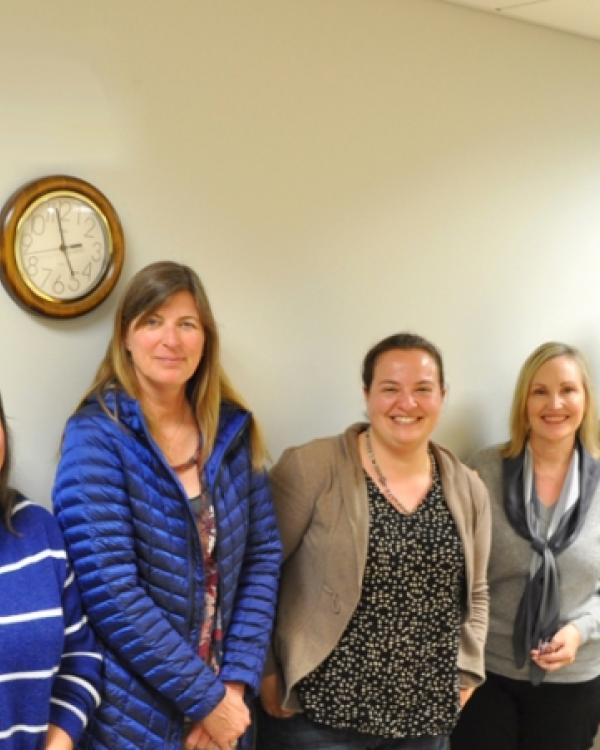
Sharon Conley (third for right) with the students in her Doctoral Seminar in Policy and Leadership
“There is nothing so practical as a good theory,” psychologist Kurt Lewin said. Professor in the Department of Education Sharon Conley’s aim is to take Lewin’s words to heart, for she says, “My work lies at the intersection of organizational theory and the applied field of educational leadership.” With colleague Ernestine Enomoto, Professor Emeritus at the University of Hawaii, Conley has participated in conferences over the years addressing the relevance of organizational theory to the field of administration.
Conley quotes from one of their conference proposals as a way to explain: “Well over 20 years ago, organizational theorist Jeffrey Pfeffer argued that there was a proliferation of management and organizational theories, making the field resemble more of a weed patch than a well tended garden. He reiterated the claim in more recent writings and others have done the same to indicate the separate agendas and diverse perspectives present in the field, often politically motivated and directed toward advocacy. However, as many organizational theories have developed outside the field of education, there are few empirical examples in education upon which education faculty and researchers can draw. Thus, a concern for those faculty who specialize in educational leadership is not only to make organizational theory relevant and related to practice, but also to determine which theories might be useful and relevant.”
Since 2005, Conley and Enomoto have carried out a line of research arguing about the relevance of an organizational theory of routines developed by Martha Feldman to schools. Conley elaborates, “Routines, such as attendance taking and teacher class assignment, for example, abound in school organizations and form standard ways of doing things that influence how organizational participants act.” Conley quotes from her 2015 article in the Journal of School Leadership to suggest why routines are relevant: “First, educational leaders who are able to examine, analyze, and initiate changes in routines may help their schools adapt to critical changes in the environment. Second, administrators may emphasize routines as a lever for fundamental change in an organization. Third, the degree to which reform initiatives actually change organizational routines or leverage change in the organization may be an indicator of school transformation. That is, a seemingly fundamental change that leaves daily routines untouched may not result in major school reform.”
Routines in school organizations, then, offer more than constancy and stability. Although they reinforce expected and habitual ways of doing things, there is sufficient evidence that routines provide avenues for change as individual members reflect and respond differently. Conley and Enomoto’s research shows that people can interpret what they are doing and demonstrate responsiveness, rather than merely repeat a given routine. In this way, changes become evident in everyday actions.
In a second selection drawn from organizational theory to examine schools, Conley, working with Sukkyung You, Professor at Hankuk University of Foreign Studies, drew on organizational theory related to teacher workplace factors. Their goal: identifying “alterable” aspects of the workplace for enhancing teacher satisfaction and reducing teacher attrition. This recent effort, published in Educational Management Administration & Leadership in 2017, uses teacher data from the 2007-08 Schools and Staffing Survey to explore workplace factors among special education teachers. As Conley says, “Special education teachers, particularly new special education teachers, may be at risk for leaving the profession. Although administrative support is one workplace factor, others include teacher team efficacy that can buffer teachers from role conflict.” The study found not only administrative support but also teacher team efficacy to have direct effects on whether teachers remained in their jobs.
Conley remains excited that we are just at the beginning of understanding how organizational theory perspectives are applicable within the field of educational administration and schools. “Specifically, two questions emerging from decades of conferences on leader preparation appear relevant,” Conley asserts. “One, curriculum-related, deals with university-level leader preparation: Given the multiplicity of theories that populate the field, which ones are useful and relevant and can be applied to the field of educational leadership? How can they be presented in such a way that broadens prospective leaders’ understanding without being overwhelming? The second deals with the knowledge base: Administrators are often torn between theory and the realities of the day. What is the appropriate place for organizational theory as a knowledge base for school as well as higher education administrators?”